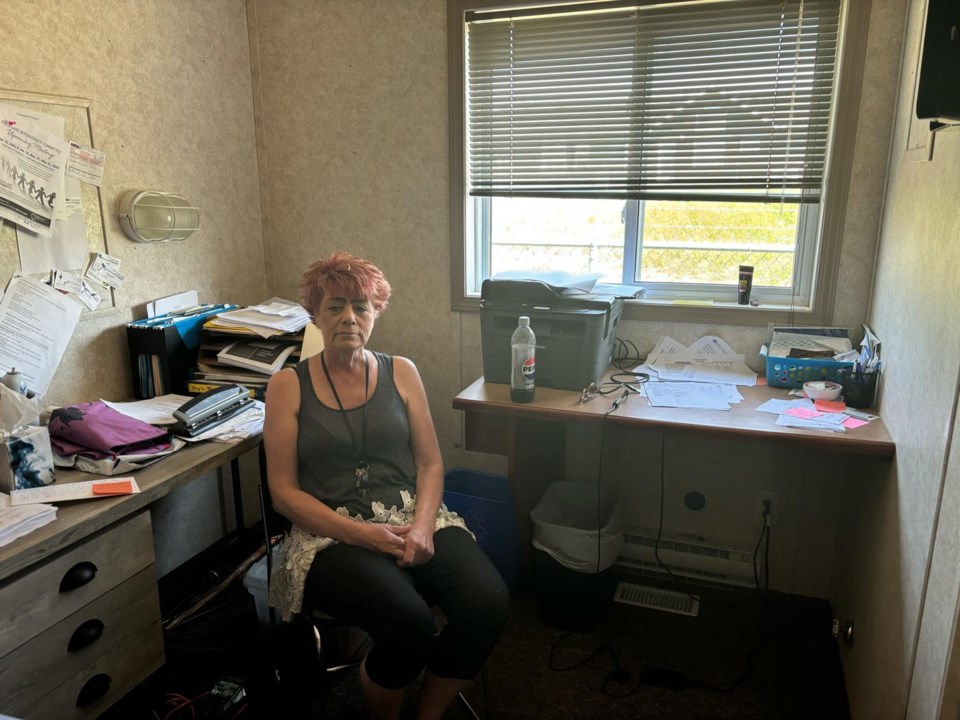COLD LAKE, ALTA. — In Cold Lake, Alta., drivers leaning through windows at the McDonald’s drive-thru have been ambushed by people running by and snatching food right out of their hands.
At the Tim Hortons, a worker was attacked for confronting someone who smeared feces all over the bathroom walls.
At the Home Hardware, customers have opened display garden sheds to find people living inside.
Police have found makeshift homes in storm sewers.
Fire crews responded to more than 20 fires in 2023 set by people trying to keep warm at encampments.
The local garbage dump has been picked over nightly by those looking for furniture and clothes.
Businesses lock their doors during daytime hours. If customers want in, they have to knock.
The local Ramada hotel has built a fence, locks its doors at night and has extra security to combat people who have come inside swearing and confronting staff, brandishing knives, hanging around in bathrooms and smoking in stairwells.
“It got physical. We called RCMP all the time,” said hotel manager Viva Romanillos.
Romanillos said she starts every day shooing away people who've congregated overnight outside the hotel's locked door.
The disruptions, she estimates, drive away customers at a cost of thousands of dollars.
Cold Lake is a community of 16,000, sitting northeast of Edmonton on the shores of the lake of the same name near the Saskatchewan boundary. Just south is Canadian Forces Base Cold Lake, Canada’s busiest fighter base.
Mayor Craig Copeland, sitting in a local coffee shop, says his city’s problems mirror those of many others: homelessness and crime combined with a lack of help for those with mental health and drug abuse issues.
"You're seeing petty crime everywhere," Copeland said.
He said the number of those roaming and living on the streets in the city has ballooned to 230 from 30 over five years.
They’re coming from remote communities further north and from areas in Saskatchewan, he said.
He added that most of the petty crimes involve repeat offenders addicted to meth, a highly addictive drug that has become cheaper, readily available and leaves people in a psychosis for several days.
"These individuals are staying awake for like three or four days and they're wandering around. The psychosis makes them aggressive.”
Copeland said with the nearest services for the homeless hours away, the city had to open its first homeless shelter about a year ago.
The city has also passed a bylaw banning overnight loitering in back alleys and aggressive panhandling near businesses. Public benches have been ripped out.
Private security has been hired. Police have been directed to charge more people who don't abide by the bylaws.
About 7,000 kilograms of garbage has also been trucked away from a local encampment.
"If we don't take this approach, you're rewarding bad behaviour, right?” said Copeland.
“We want to send a message that if you're going to stay in Cold Lake, you have to behave yourselves. Otherwise go tell these business owners here in Cold Lake that it's OK that they run out of business."
Mike Ellis, Alberta’s public safety minister, said this week the province is aware of the problems in Cold Lake and is ready to help.
The local MP, Conservative Laila Goodridge, has blamed the problems on Prime Minister Justin Trudeau’s Liberal government, saying "crime, chaos and disorder are the norm."
Leona Heisler, who runs the local 20-bed homeless shelter, says Alberta and Ottawa need to work together and pony up more money to help those with drug and mental health issues.
"The majority of the individuals that are here ... lost their kids, they've lost their home. This is the worst parts of their life," Heisler said.
She recalled helping a woman dealing with a meth addiction and trauma so severe that staff had to repeatedly stop her from running outside in the winter with no shoes.
"She never knew where she was. (She was) talking to the walls," Heisler said.
She said the city’s crackdown has helped but doesn’t fix the bigger issues.
"It's just a revolving door. It’s just a cycle, Heisler said.
“Over and over and over."
This report by The Canadian Press was first published July 20, 2024.
Fakiha Baig, The Canadian Press




